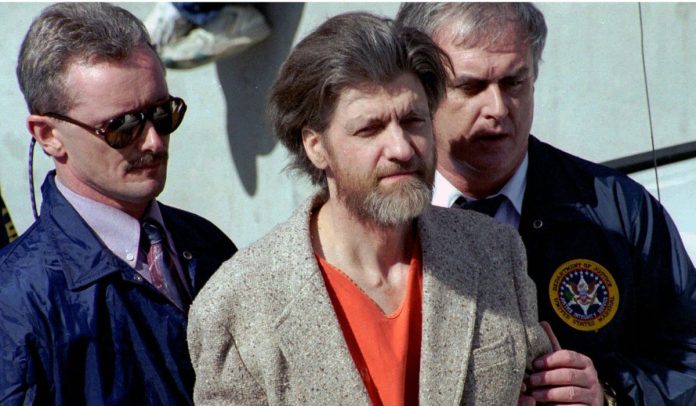On this day, April 24th, the name Ted Kaczynski echoes through the annals of history, a name synonymous with terror, violence, and a profound disillusionment with modern society. Kaczynski, better known as the Unabomber, was a domestic terrorist whose reign of terror spanned nearly two decades, leaving a trail of destruction and fear in his wake. Yet, beyond the heinous acts he committed, Kaczynski’s story is a complex and multifaceted one, reflecting the darker undercurrents of societal discontent and the potential consequences of unchecked extremism.
Born in 1942 in suburban Chicago, Kaczynski was a child prodigy, excelling academically from an early age. He enrolled at Harvard University at just 16 years old, where he participated in a series of controversial psychological experiments that some believe may have contributed to his later descent into extremism. After obtaining his doctorate in mathematics from the University of Michigan, Kaczynski retreated to a remote cabin in the Montana wilderness, where he began to cultivate his radical anti-technology ideology.
It was in 1978 that Kaczynski embarked on his campaign of violence, sending the first of what would become a series of increasingly sophisticated package bombs to various targets across the United States. His victims ranged from university professors to computer store owners, all united by their perceived association with the technology and industrialization that Kaczynski despised.
For nearly two decades, the Unabomber remained elusive, evading capture and sowing fear throughout the nation. It wasn’t until 1995, when Kaczynski demanded that his 35,000-word manifesto, “Industrial Society and Its Future,” be published, that a breakthrough in the case occurred. The manifesto, a scathing critique of modern society and its reliance on technology, struck a chord with Kaczynski’s brother, David, who recognized the writing style and ultimately alerted the authorities.
On April 3, 1996, Ted Kaczynski was apprehended at his remote Montana cabin, bringing an end to one of the longest and most expensive manhunts in American history. His arrest and subsequent trial captivated the nation, with many struggling to reconcile the image of the brilliant but reclusive mathematician with the ruthless terrorist responsible for killing three people and injuring countless others.
Kaczynski’s actions were undoubtedly abhorrent, but his motives and the philosophical underpinnings of his manifesto continue to be dissected and debated to this day. At the core of his ideology was a deep-seated belief that modern society, with its reliance on technology and industrialization, was inherently destructive and dehumanizing. He saw himself as a champion of freedom and individuality, fighting against the encroaching forces of conformity and control.
While Kaczynski’s methods were reprehensible, his critique of modern society struck a chord with some who shared his disillusionment with the rapid pace of technological progress and the perceived erosion of individual liberty. His manifesto, while often dismissed as the ramblings of a madman, resonated with those who felt disenfranchised by the relentless march of modernity, offering a radical and violent solution to what he saw as a fundamental societal ill.
Kaczynski’s legacy is multifaceted and complex, representing both the dangers of extremism and the importance of addressing societal discontent before it festers into something more sinister. On one hand, he serves as a cautionary tale of what can happen when ideological fervor is allowed to spiral into violence and hatred. His actions claimed innocent lives and left a trail of fear and anguish in their wake, forever staining his name in the annals of domestic terrorism.
Yet, on the other hand, Kaczynski’s story is a reminder of the need to confront the underlying issues that can breed extremism and societal disillusionment. While his methods were abhorrent, the themes he explored in his manifesto – the erosion of individuality, the perceived dehumanization of modern life, and the relentless march of technology – resonated with those who felt left behind by the rapid pace of change.
In many ways, Kaczynski’s legacy is a reflection of the broader societal tensions and anxieties that continue to shape our world today. As technology advances at an ever-increasing pace, and as globalization and industrialization continue to reshape the fabric of our societies, there are those who feel disenfranchised and disconnected from the world around them. Kaczynski’s descent into extremism serves as a stark reminder of the potential consequences of ignoring these undercurrents of discontent.
Today, on April 24th, the memory of Ted Kaczynski endures, not only as a reminder of the devastating impact of domestic terrorism but also as a cautionary tale about the importance of addressing societal disillusionment and the root causes that can fuel extremism. His story highlights the need for open and honest dialogue about the challenges of navigating the complexities of modern life, and the importance of finding constructive and peaceful solutions to the issues that divide us.
As we reflect on Kaczynski’s legacy, we must also acknowledge the resilience of the human spirit and the power of compassion and understanding to overcome even the darkest of ideologies. While his actions were reprehensible, his story serves as a reminder that even the most extreme ideologies can be challenged and overcome through open dialogue, education, and a commitment to fostering a more inclusive and equitable society.
In the end, Ted Kaczynski’s name will forever be associated with terror and violence, but it also serves as a complex and multifaceted symbol of the societal tensions and disillusionment that can breed extremism. As we confront the challenges of the modern world, it is imperative that we learn from his story, addressing the root causes of discontent and fostering a society that embraces diversity, individuality, and the pursuit of a peaceful and equitable future for all.

